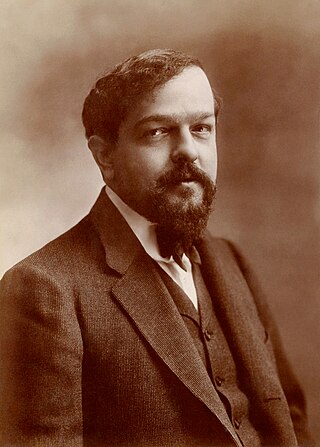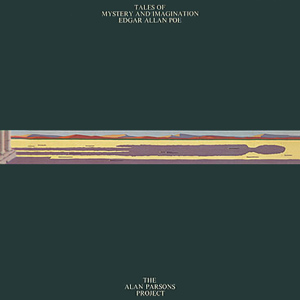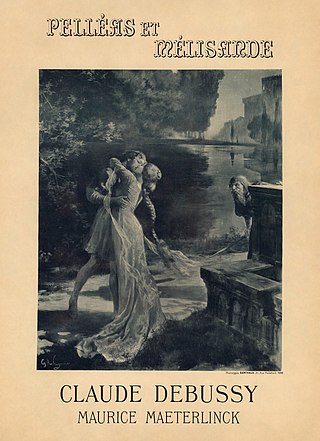
(Achille) Claude Debussy was a French composer. He is sometimes seen as the first Impressionist composer, although he vigorously rejected the term. He was among the most influential composers of the late 19th and early 20th centuries.

Eric Alfred Leslie Satie, who signed his name Erik Satie after 1884, was a French composer and pianist. He was the son of a French father and a British mother. He studied at the Paris Conservatoire, but was an undistinguished student and obtained no diploma. In the 1880s he worked as a pianist in café-cabaret in Montmartre, Paris, and began composing works, mostly for solo piano, such as his Gymnopédies and Gnossiennes. He also wrote music for a Rosicrucian sect to which he was briefly attached.

The Fall of the House of Usher (1928) is a short silent horror film adaptation of the 1839 short story "The Fall of the House of Usher" by Edgar Allan Poe. The movie was co-directed by James Sibley Watson and Melville Webber, and starred Herbert Stern, Hildegarde Watson, and Melville Webber. It tells the story of a brother and sister who live under a family curse. An avant-garde experimental film running only 13 minutes, the visual element predominates, including shots through prisms to create optical distortion. There is no dialogue in the film, though one sequence features letters written in the air moving across the screen.

Tales of Mystery and Imagination (Edgar Allan Poe) is the debut studio album by British rock band The Alan Parsons Project. It was released on 25 June 1976 in the United Kingdom by Charisma Records. The lyrical and musical themes of the album, which are retellings of horror stories and poetry by Edgar Allan Poe, attracted a cult audience. The title of the album is taken from the title of a collection of Poe's macabre stories of the same name.

Pelléas et Mélisande is an opera in five acts with music by Claude Debussy. The French libretto was adapted from Maurice Maeterlinck's symbolist play of the same name. It premiered at the Salle Favart in Paris by the Opéra-Comique on 30 April 1902; Jean Périer was Pelléas and Mary Garden was Mélisande, conducted by André Messager, who was instrumental in getting the Opéra-Comique to stage the work. The only opera Debussy ever completed, it is considered a landmark in 20th-century music.

"The Fall of the House of Usher" is a short story by American writer Edgar Allan Poe, first published in 1839 in Burton's Gentleman's Magazine, then included in the collection Tales of the Grotesque and Arabesque in 1840. The short story, a work of Gothic fiction, includes themes of madness, family, isolation, and metaphysical identities.

House of Usher is a 1960 American gothic horror film directed by Roger Corman and written by Richard Matheson from the 1839 short story "The Fall of the House of Usher" by Edgar Allan Poe. The film was the first of eight Corman/Poe feature films and stars Vincent Price, Myrna Fahey, Mark Damon and Harry Ellerbe.

The Fall of the House of Usher is a 1928 French horror film directed by Jean Epstein, one of several films based on the 1839 Gothic short story The Fall of the House of Usher by Edgar Allan Poe.

The Fall of the House of Usher is an opera by Peter Hammill (music) and Chris Judge Smith (libretto). It is based on the 1839 short story of the same name by Edgar Allan Poe.

Le diable dans le beffroi is an unfinished comic opera in one act by Claude Debussy to his own libretto, based on Edgar Allan Poe's short story "The Devil in the Belfry".
La chute de la maison Usher is the French translation of the title of Edgar Allan Poe's tale The Fall of the House of Usher (1839). The most famous French translation of the story is by Charles Baudelaire. It is the basis of the following works:
"The Fall of the House of Usher" is an 1839 short story by Edgar Allan Poe.

"The Devil in the Belfry" is a satirical short story by Edgar Allan Poe. It was first published in 1839.
Brian Mulligan is an American operatic baritone who has performed in major opera houses and concert halls all over the world.
Jean-Philippe Lafont is a French baritone. He studied in his native city of Toulouse and later at the Opéra-Studio in Paris. He made his operatic debut as Papageno in The Magic Flute at the Salle Favart, Paris in 1974. He went on to appear regularly in Toulouse, where he first played the title role in Verdi's Falstaff in 1987.
The Fall of the House of Usher is a 1950 British horror film directed by Ivan Barnett and starring Gwen Watford in her film debut, with Kaye Tendeter and Irving Steen. It is an adaptation of the 1839 short story of the same title by Edgar Allan Poe.
C. William Harwood was an American conductor. Chiefly remembered for his work as an opera conductor, he notably conducted the Houston Grand Opera's groundbreaking 1977 national tour of George Gershwin's Porgy and Bess. He also conducted the world premieres of operas by Claude Debussy, Frederick Delius, Stephen Paulus, and George Rochberg.
Juan Allende-Blin is a Chilean composer and academic teacher who lives in Germany.
Colette Lorand was a Swiss operatic soprano who made an international career. Known as a coloratura soprano, she created several roles in world premieres, including Sibylle in Carl Orff's De temporum fine comoedia in 1973 at the Salzburg Festival, and Regan in Aribert Reimann's Lear at the Nationaltheater München in 1978, also in the French premiere of this opera in Paris in 1982.

The Fall of the House of Usher is an American gothic horror drama television miniseries created by Mike Flanagan. All eight episodes were released on Netflix on October 12, 2023, each directed by either Flanagan or Michael Fimognari, with the latter also acting as cinematographer for the entire series.












